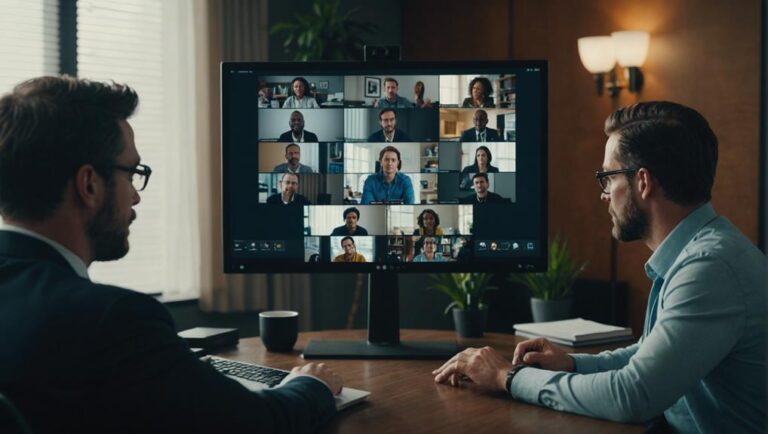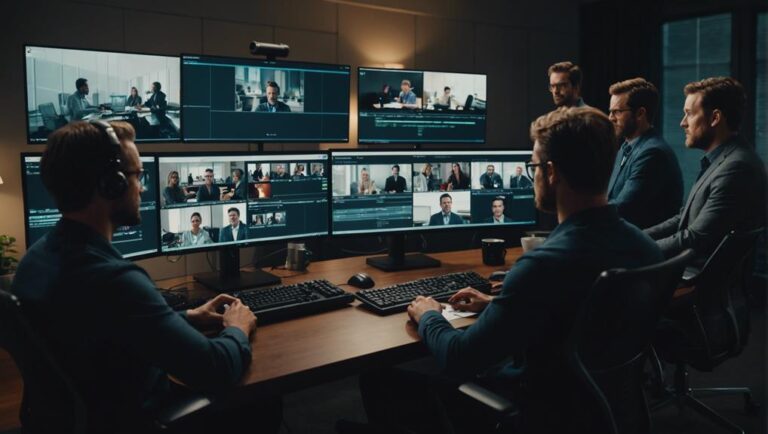Building Trust and Camaraderie in Remote Teams
To build trust and camaraderie in remote teams, focus on clear communication. Use channels like virtual meetings and daily check-ins for updates and collaboration. Engage in team bonding activities and set expectations and goals transparently. Encourage open communication and collective decision-making for trust. Recognize and appreciate efforts to boost morale. Offer opportunities for virtual socializing to enhance connection. Feedback and peer reviews aid team growth. Leading by example with essential trust-building behaviors is vital for leaders. Proactive strategies foster cohesion and success in virtual work environments. Keep implementing these strategies for sustainable team unity and productivity.
Establish Clear Communication Channels
To foster trust and camaraderie in remote teams, it's essential to establish clear communication channels that facilitate efficient information sharing and collaboration. When it comes to remote feedback, providing regular and constructive input is vital for team members to feel connected and valued.
Utilizing virtual meetings is a powerful tool for enhancing communication by allowing for face-to-face interactions, which can help build stronger relationships among team members. In virtual meetings, encourage active participation from all team members to guarantee that everyone has a voice and feels included in discussions. Additionally, using video calls instead of just relying on audio can make meetings more engaging and personal, bridging the physical gap between team members.
Creating a structured feedback system within virtual meetings can also promote transparency and accountability within the team. This not only enhances communication but also fosters continuous improvement and growth. By establishing these clear communication channels, remote teams can effectively exchange ideas, address challenges, and work together seamlessly towards common goals.
Encourage Regular Check-Ins
Regular check-ins serve as an essential component in maintaining team cohesion and communication within remote teams. Daily check-ins provide a platform for quick updates on individual tasks and overall progress. These brief interactions help team members stay informed about each other's work, preventing silos and ensuring alignment towards common goals.
Weekly progress check-ins offer a more thorough view of the team's accomplishments, challenges, and upcoming milestones. Encouraging these regular touchpoints fosters a sense of accountability and shared responsibility within the team.
Furthermore, beyond task-related discussions, check-ins also play an important role in nurturing team connections. They provide an opportunity for team members to share personal updates, discuss common interests, and build rapport in a remote setting. These informal conversations contribute to strengthening relationships, increasing trust among team members, and enhancing overall camaraderie.
Foster Virtual Team Bonding Activities
In cultivating camaraderie and trust within remote teams, fostering virtual team bonding activities is a strategic approach to enhancing team cohesion and collaboration.
Virtual game nights and team challenges are effective ways to bring team members together in a fun and engaging manner. Virtual game nights allow team members to relax, laugh, and interact in a casual setting, fostering a sense of togetherness despite physical distance. Games like virtual Pictionary, trivia quizzes, or online escape rooms can help break the monotony of work and create memorable shared experiences.
On the other hand, team challenges such as virtual scavenger hunts or collaborative problem-solving tasks promote teamwork, communication, and a sense of achievement when goals are met. These activities not only strengthen relationships among team members but also boost morale and productivity.
Set Clear Expectations and Goals
To build trust and camaraderie in your remote team, setting clear expectations and goals is essential. Clear communication is key to ensuring everyone knows their role and responsibilities.
Clear Communication Key
Effective team communication hinges on the establishment of clear expectations and goals, laying a solid foundation for trust and camaraderie to flourish within remote teams.
In the domain of virtual team building, clear communication becomes even more critical. When team members aren't physically present with one another, the need for transparent and concise communication is heightened to guarantee alignment and understanding.
Research shows that remote trust building is deeply intertwined with the clarity of communication. By clearly outlining expectations and goals, team members can better comprehend their individual roles and responsibilities within the team. This understanding fosters a sense of accountability and mutual respect among team members, leading to stronger bonds and increased trust.
To enhance clear communication within remote teams, it's essential to utilize various communication tools effectively. Regular video conferences, instant messaging platforms, and project management software can facilitate seamless information sharing and ensure that everyone is on the same page.
Define Roles Clearly
Establishing clear roles within a remote team is foundational to ensuring alignment and productivity, fostering a shared understanding of expectations and goals among team members. Role clarity is essential for effective team dynamics, as it helps team members know their responsibilities, reduces confusion, and minimizes duplication of efforts.
When roles are well-defined, individuals can work cohesively towards common objectives, enhancing overall team performance.
Setting clear expectations is equally important. Clearly outlining what's expected from each team member promotes accountability and helps in measuring progress. By defining roles and expectations, you create a framework that guides team members on how to contribute effectively to the team's success.
This clarity not only boosts productivity but also builds trust among team members, as everyone knows what's expected of them.
In remote teams, where physical presence is lacking, defining roles and expectations becomes even more critical. It provides a sense of structure and direction, fostering a collaborative environment where team members can rely on each other to fulfill their responsibilities.
Promote Transparency and Openness
To foster trust and camaraderie in your remote team, promoting transparency and openness is crucial. Clear communication channels guarantee that information flows freely, nurturing a culture of trust and collaboration.
Implementing a shared decision-making process and providing honest and regular updates further solidify transparency within the team, creating a strong foundation for success.
Clear Communication Channels
Promoting transparency and openness within communication channels is essential for fostering trust and camaraderie in remote teams. In the virtual landscape, where face-to-face interactions are limited, clear communication becomes the cornerstone of successful collaboration.
Utilizing communication tools tailored to remote culture, such as video conferencing platforms and instant messaging apps, can facilitate virtual brainstorming sessions and enhance team bonding.
Effective communication channels not only guarantee that information flows seamlessly but also create a sense of inclusivity and shared purpose among team members. By encouraging open dialogue and sharing ideas transparently, remote teams can overcome challenges related to distance and time zones, fostering a cohesive work environment.
Additionally, establishing guidelines for communication etiquette and responsiveness helps in reducing misunderstandings and promoting a culture of respect and mutual understanding.
Shared Decision-Making Process
In order to cultivate transparency and openness within remote teams, fostering a shared decision-making process is crucial for enhancing collaboration and trust among team members.
Joint problem-solving and team decision-making are essential aspects of this process. Collaborative brainstorming allows team members to share ideas, perspectives, and insights, leading to a more thorough understanding of the challenges at hand.
Group consensus building guarantees that decisions aren't made in isolation but rather through collective agreement, promoting a sense of ownership and accountability among team members. By involving everyone in the decision-making process, remote teams can leverage the diverse skills and experiences of their members, resulting in more innovative and effective solutions.
This approach also fosters a culture of mutual respect and cooperation, where each team member feels valued and empowered to contribute to the team's success. Shared decision-making not only strengthens the bonds between team members but also paves the way for a more cohesive and productive remote team environment.
Honest and Regular Updates
Ensuring regular and candid updates within remote teams is pivotal for fostering a culture of transparency and openness. Weekly updates on team progress not only keep everyone informed but also promote a sense of accountability and shared responsibility. Transparent communication through these updates is key to building trust among team members who may be physically distant from each other.
By providing weekly updates, team members are kept in the loop about project developments, challenges faced, and achievements made. This consistent flow of information helps team members understand the bigger picture and how their individual contributions fit into the team's goals. It also allows for open discussions, feedback exchange, and a platform for addressing any concerns promptly.
Through honest and regular updates, remote teams can bridge the gap created by physical distance and time zones. This practice fosters a collaborative environment where team members feel connected, valued, and engaged in the team's progress.
Ultimately, transparent communication through weekly updates is a powerful tool for trust building in remote teams.
Leverage Technology for Collaboration
By integrating cutting-edge communication tools and platforms, remote teams can effectively streamline their collaboration efforts and enhance productivity.
Virtual brainstorming sessions are facilitated through video conferencing tools like Zoom or Microsoft Teams, allowing team members to share ideas in real-time regardless of geographical locations.
Collaboration tools such as Slack or Trello enable seamless communication and task management, ensuring that everyone is on the same page regarding project progress and deadlines.
Online team building activities can be organized through platforms like Donut or Icebreaker, fostering a sense of unity and camaraderie among team members who may never meet face-to-face.
Remote project management software, such as Asana or Monday.com, provides a centralized hub for tracking tasks, timelines, and goals, keeping everyone accountable and informed.
Leveraging these technologies not only improves communication and collaboration within remote teams but also helps establish a strong foundation for trust and camaraderie to thrive.
Recognize and Appreciate Team Efforts
Recognizing and appreciating team efforts plays a pivotal role in fostering motivation and cohesion within remote teams, ultimately contributing to a positive work culture and enhanced productivity. Team recognition is essential in acknowledging the hard work and dedication of individuals, leading to increased job satisfaction and a sense of value within the team. By actively appreciating efforts, team bonding is strengthened, creating a supportive environment where team members feel respected and acknowledged.
Virtual celebrations can also be a powerful tool in recognizing team achievements and milestones. Whether it's through virtual team lunches, online recognition ceremonies, or simply sending out personalized thank you messages, these gestures go a long way in boosting morale and fostering a sense of camaraderie among team members. Such initiatives not only acknowledge individual contributions but also highlight the collective success of the team, reinforcing a culture of appreciation and mutual respect.
In remote settings, where face-to-face interactions are limited, these gestures play an important role in building trust and rapport among team members.
Provide Opportunities for Virtual Socializing
Creating opportunities for virtual socializing is essential for remote teams to build trust, camaraderie, and a sense of connection among team members. In a digital work environment, fostering a social bond can be challenging, but incorporating activities like virtual happy hours and online game nights can greatly enhance team dynamics.
Virtual happy hours provide an informal setting where team members can relax, chat, and get to know each other on a personal level outside of work-related tasks. This can help break down barriers and create a more relaxed atmosphere for communication and collaboration.
Similarly, organizing online game nights can inject a sense of fun and friendly competition into the team dynamic. Games can range from virtual trivia challenges to collaborative problem-solving activities, offering team members a chance to engage with each other in a light-hearted setting.
These activities not only promote team building but also help alleviate feelings of isolation and enhance overall team morale. By incorporating virtual socializing opportunities, remote teams can strengthen relationships, boost team spirit, and ultimately improve productivity and job satisfaction.
Encourage Feedback and Constructive Criticism
Encouraging feedback and constructive criticism in your remote team can lead to increased transparency and improved collaboration.
By fostering open communication channels, you create a space where team members feel comfortable sharing their thoughts and ideas.
Embracing feedback as a tool for team growth can help address issues proactively and drive continuous improvement within your remote team.
Foster Open Communication
Promote a culture of transparent communication by actively soliciting feedback and fostering an environment where constructive criticism is valued and encouraged among team members.
In virtual team building scenarios, remote communication plays an essential role in maintaining strong connections. Encouraging open communication channels can enhance team dynamics and productivity.
Establishing regular feedback sessions allows team members to express their thoughts, address concerns, and provide suggestions for improvement. Constructive criticism should be viewed as a tool for growth rather than as a negative aspect, fostering a culture where team members feel comfortable sharing their perspectives.
Research indicates that teams that openly communicate and provide feedback exhibit higher levels of trust and cohesion. By embracing open communication practices, remote teams can bridge the physical gap and build a sense of camaraderie.
Encouraging feedback and constructive criticism not only enhances team performance but also fosters a supportive environment where team members feel heard and valued.
Embrace Team Growth
To foster team growth effectively, prioritize the cultivation of a culture that embraces feedback and constructive criticism within your remote team. Implementing team growth strategies and virtual team-building exercises can greatly enhance remote team dynamics and trust-building techniques.
Encouraging feedback and constructive criticism creates an environment where team members feel safe to share their thoughts and ideas, leading to improved collaboration and productivity. Constructive criticism should be viewed as an opportunity for growth rather than a negative judgment. When team members provide feedback, it should be specific, actionable, and focused on behaviors rather than personalities.
By fostering a culture of open communication and feedback, remote teams can address issues promptly, adapt to challenges more effectively, and continuously improve their performance. Additionally, regular feedback sessions, team evaluations, and peer reviews can contribute to building trust and camaraderie within the team.
Embracing team growth through feedback mechanisms not only enhances individual development but also strengthens the overall team dynamics in a virtual setting.
Lead by Example in Building Trust
Leaders in remote teams can effectively build trust by actively demonstrating behaviors that foster trust and camaraderie among team members. Trust building is a vital component of successful teamwork, especially in a remote setting where face-to-face interactions are limited.
By leading by example, you set the tone for how trust should be cultivated within the team. To lead by example in building trust, it's imperative to be transparent and honest in your communications. Share information openly, admit mistakes, and seek feedback from team members.
When you demonstrate vulnerability and authenticity, others are more likely to reciprocate, creating a culture of trust within the team. Additionally, show empathy and support for your team members. Acknowledge their efforts, offer assistance when needed, and celebrate their successes.
Conclusion
To sum up, building trust and camaraderie in remote teams is essential for fostering collaboration and productivity.
By establishing clear communication channels, encouraging regular check-ins, and promoting virtual team bonding activities, you can create a strong sense of unity among team members.
Remember, trust is the glue that holds a team together, so don't be afraid to go the extra mile to cultivate a supportive and connected remote work environment.







